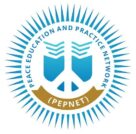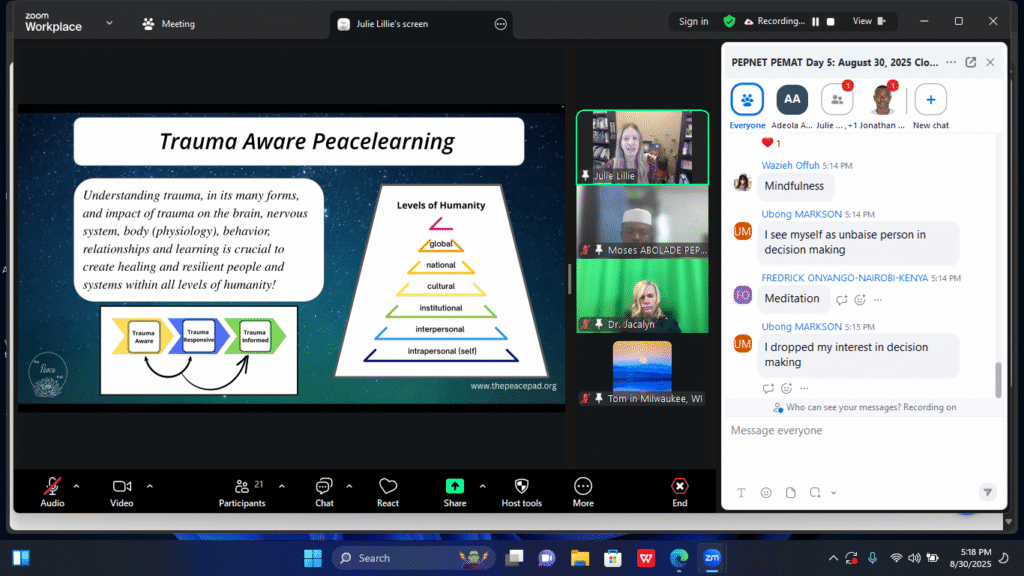The August 2025 Special Edition of the Peace Education and Management Training (PEMAT) was successfully held on the 2nd, 9th, 16th, 23rd, and 30th of August, concluding with a lively and inspiring closing ceremony.
This edition brought together over 20 participants from diverse countries including the Democratic Republic of Congo, Kenya, and the United States. The mix of cultures, professional backgrounds, and experiences created a dynamic space for learning, exchange, and collaboration.
The program was carefully designed to strengthen the professional capacity of peace practitioners, equipping them with practical tools for peacebuilding, organizational development, and sustainable social change.
The Peace Education and Management Training (PEMAT) 2025 – August Special Edition took place on five consecutive Saturdays, 2nd, 9th, 16th, 23rd, and 30th of August; culminating in a lively and inspiring closing ceremony.
This edition brought together over 20 participants representing diverse backgrounds and geographies, including the Democratic Republic of Congo, Kenya, and the United States, alongside Nigerian participants. The program created a vibrant environment for cross-cultural exchange, collaborative learning, and professional networking, with participants describing it as one of the most enriching professional experiences of their peacebuilding journey.
PEMAT 2025 was designed to strengthen the professional capacity of peace practitioners by equipping them with advanced tools for peace education, conflict management, organizational development, and sustainable social change. The program blended academic rigor, interactive dialogue, and practical skills training, ensuring that participants left not only with new knowledge but also with actionable strategies for real-world peacebuilding.
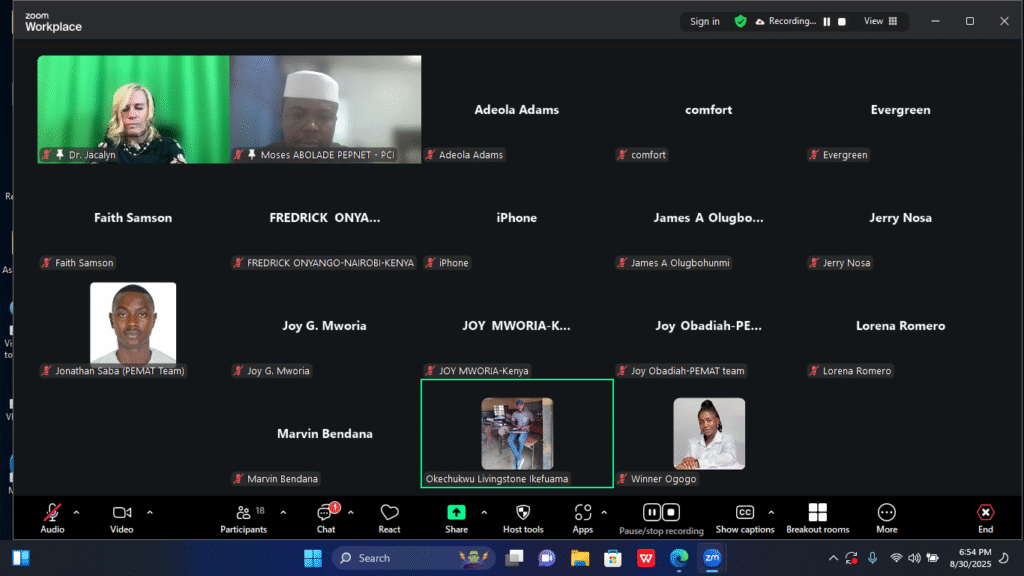
Facilitators
The strength of PEMAT lies in its facilitators, experienced professionals who bring a blend of scholarship, practice, and passion for peace. The August 2025 edition featured a multidisciplinary team:
Amb. Moses ABOLADE (PEPNET) – Peace scholar and practitioner with expertise in peace education and organizational leadership.
Stephanie Carey (Peace Catalyst International) – Specialist in conflict transformation and interfaith peacebuilding.
Blessing Ini (Sign Language Interpreter) – Advocate for inclusivity and accessibility in peace spaces.
Bryan Carey (Peace Catalyst International) – Practitioner with experience in grassroots peacebuilding and community engagement.
Oyebisi Babatunde Oluseyi (NNNGO) – Leader in nonprofit management, advocacy, and organizational development.
Dr. Adeola Timothy Adams (National Open University of Nigeria) – Academic expert in peace and conflict studies with a focus on monitoring and evaluation.
Julie Lillie (The Peace Pad) – Trainer in trauma-aware peace practice and community-based healing.
Patience Ikpeh Obaulo (WANEP) – Advocate for gender mainstreaming and women’s participation in peace processes.
Their combined expertise ensured a balance of theoretical foundations and practical insights, making the sessions dynamic, relevant, and highly applicable.
Training Focus Areas
Over the course of the program, participants engaged in eight interconnected modules, each addressing a critical aspect of peacebuilding and organizational management:
Practical Skills in Peace and Conflict Education
Reframed peace beyond the absence of violence, highlighting its links to justice, security, and development.
Provided tools for teaching peace in schools, communities, and organizational settings.
Fundraising and Crowdfunding for NGOs
Emphasized the power of storytelling and trust in resource mobilization.
Explored crowdfunding platforms and strategies for financial sustainability.
Monitoring and Evaluation (M&E) for Peacebuilding
Introduced participants to SMART goals (Specific, Measurable, Achievable, Relevant, and Time-bound).
Stressed that effective monitoring begins before project implementation.
Sign Language for Peace Practitioners
Offered basic sign language skills to promote inclusive peacebuilding.
Highlighted the importance of accessibility for persons with disabilities in peace spaces.
Trauma-Aware Peace Practice
Examined the impact of trauma, including depression and high-risk behaviors.
Shared supportive strategies such as patience, positive distraction, and offering choices.
NGO Management and Organizational Development
Highlighted the importance of systems and structures in sustaining passion-driven organizations.
Introduced participants to practical tools for governance, accountability, and long-term impact.
Gender Mainstreaming in Peacebuilding
Explored how integrating gender perspectives promotes equity and inclusivity.
Encouraged participants to challenge stereotypes and design gender-sensitive programs.
Conflict Analysis and Alternative Dispute Resolution (ADR)
Equipped participants with tools to map conflict causes, actors, and dynamics.
Demonstrated the value of conflict analysis in both violent and non-violent contexts.
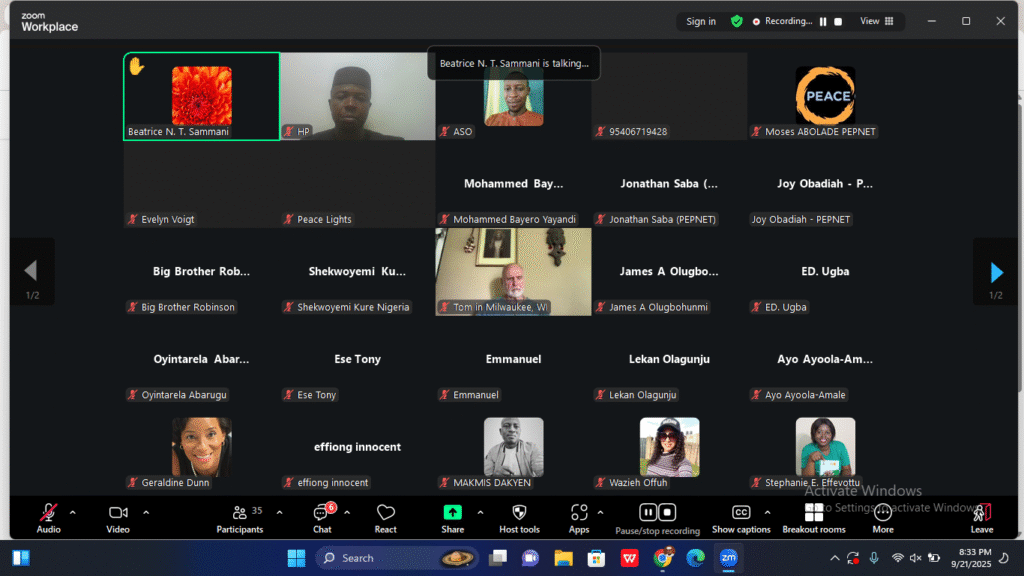
Outcomes and Impact
Enhanced Knowledge & Skills
Participants left with practical competence in peace education, conflict transformation, NGO management, fundraising, and gender mainstreaming.Promotion of Inclusivity
The sign language module increased awareness and capacity to create inclusive environments for people with disabilities in peacebuilding spaces.Personal and Professional Transformation
Many participants reported renewed confidence, inspiration, and clarity for their work. Sessions on trauma-awareness and gender mainstreaming particularly challenged assumptions and expanded horizons.Networking and Community Building
Graduates received certificates of completion and were welcomed into the PEPNET Community as affiliate members. This created a pathway for ongoing collaboration, peer learning, and professional partnerships across borders.
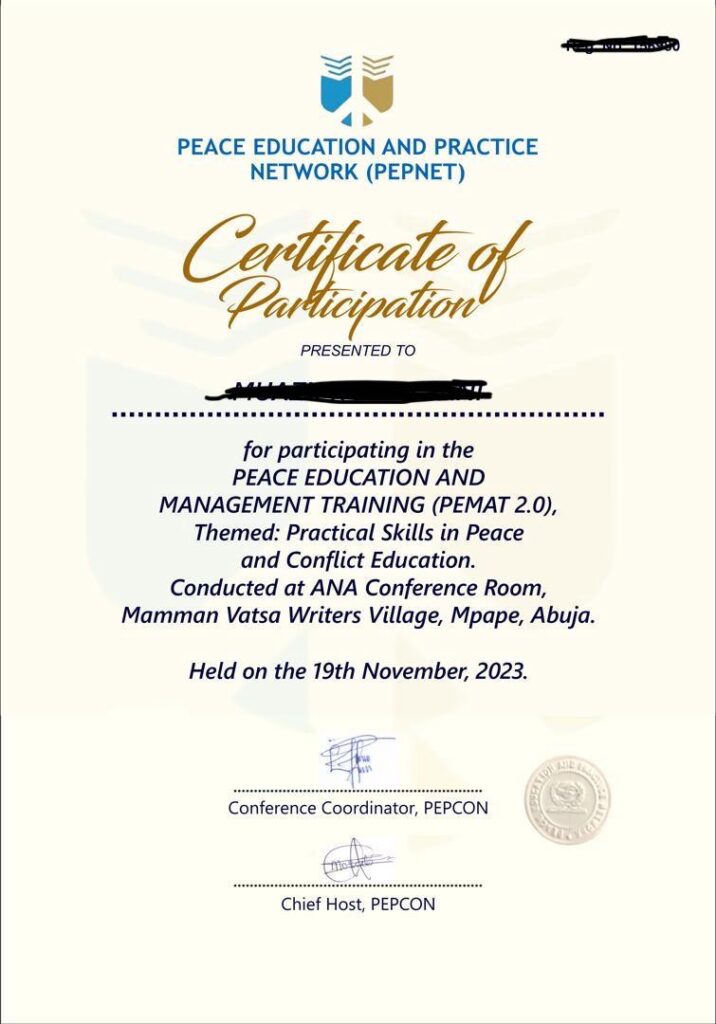
The PEMAT 2025 – August Special Edition was more than a training program, it was a transformative journey of knowledge, reflection, and connection.
By combining expert facilitation, participant-driven dialogue, and practical learning tools, PEMAT equipped peace practitioners to advance peace, justice, and sustainable development in their communities. Its impact was felt not only in the skills gained but also in the networks built, the perspectives shifted, and the renewed commitment participants expressed toward building peace.
Through programs like PEMAT, PEPNET reaffirms its mission to foster a world of peaceful individuals and resilient communities. The August 2025 edition demonstrated the power of investing in people, because when peacebuilders are empowered, communities stand stronger, conflicts are transformed, and the vision of a peaceful world becomes more attainable.
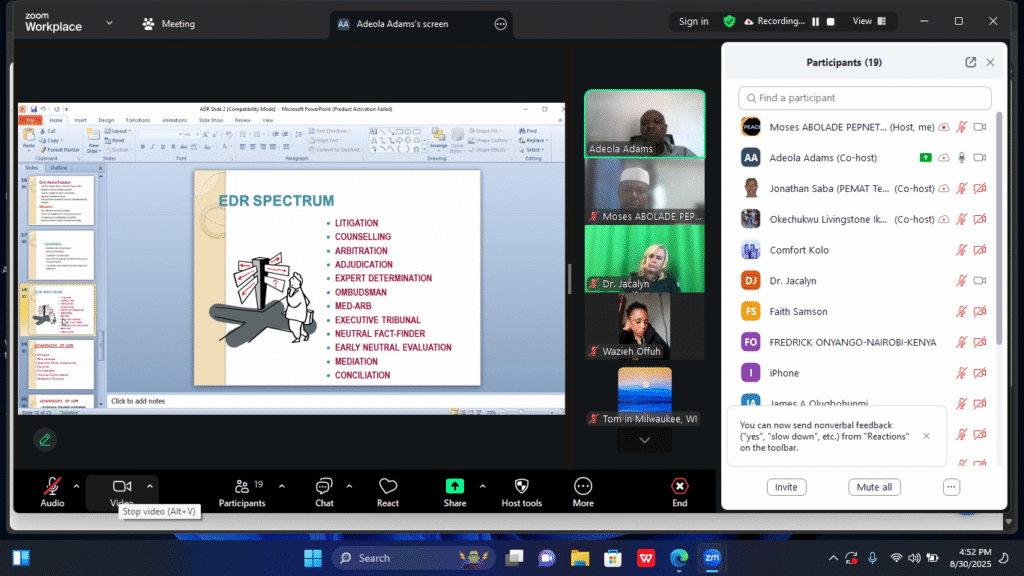
Participant Testimonials
A central highlight of PEMAT 2025 was the transformative impact on participants, who shared reflections on how the training reshaped their perspectives and practices:
Winner Ogogo described the sessions as “insightful, engaging, and eye-opening.” She emphasized the holistic approach to gender mainstreaming, the relatable storytelling in NGO Management, and the importance of incorporating monitoring, evaluation, and trust-based fundraising into every peacebuilding initiative. She concluded by noting that the program was “truly impactful” in reshaping her approach to work.
Wazieh Offoh Anthony shared that PEMAT deepened her understanding of gender and peacebuilding. She described the M&E module as a turning point, learning that monitoring should start before a project begins, a shift that has already influenced her work as a grant manager.
Dr. Jacalyn Kerbark, speaking on USA Global TV/Radio, highlighted the program’s role in expanding her knowledge of organizational development, fundraising, and trauma-aware peacebuilding. She was particularly struck by Simon Sinek’s Golden Circle framework, focusing on the Why of peacebuilding over the What and How. For her, PEMAT underscored the importance of building peace from within ourselves and drew strength from the global diversity of participants.
While these reflections stand out, they represent only part of the larger body of feedback. Many other participants praised the program’s practical relevance, inclusivity, and interactive design, reinforcing its role as a truly transformative learning experience.
The PEMAT 2025 – August Special Edition was more than a training program, it was a transformative journey of knowledge, reflection, and connection.
By combining expert facilitation, participant-driven dialogue, and practical learning tools, PEMAT equipped peace practitioners to advance peace, justice, and sustainable development in their communities. Its impact was felt not only in the skills gained but also in the networks built, the perspectives shifted, and the renewed commitment participants expressed toward building peace.
Through programs like PEMAT, PEPNET reaffirms its mission to foster a world of peaceful individuals and resilient communities. The August 2025 edition demonstrated the power of investing in people, because when peacebuilders are empowered, communities stand stronger, conflicts are transformed, and the vision of a peaceful world becomes more attainable.
